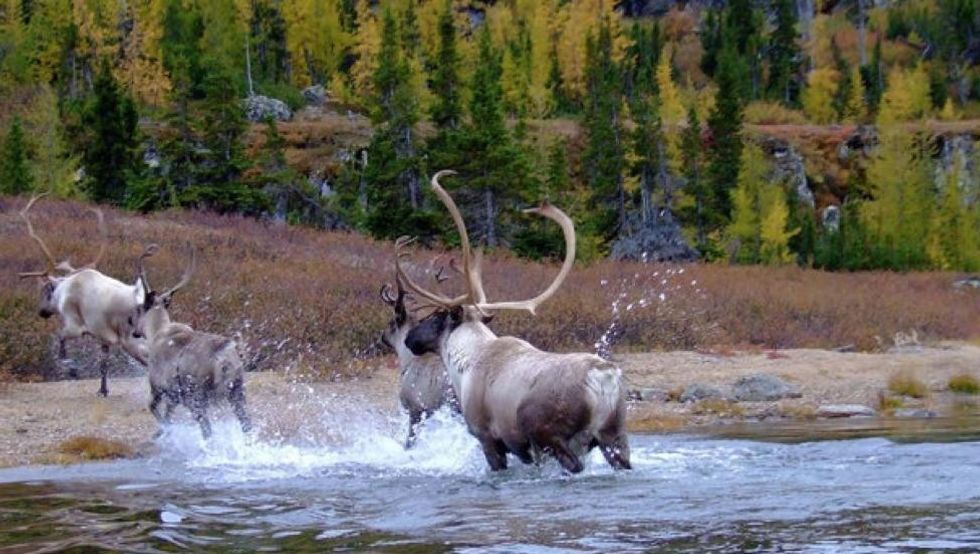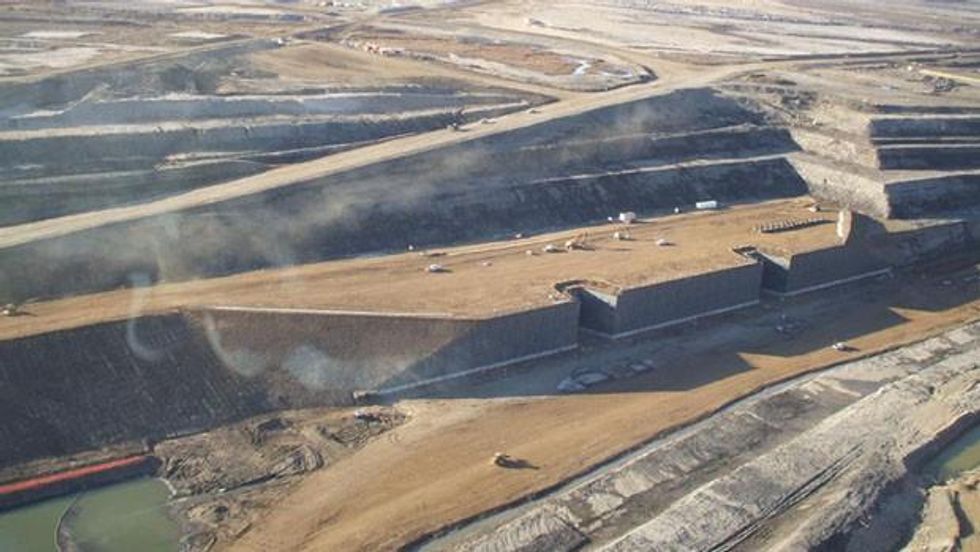Jul 10, 2013

So they blocked the project, right?
No. Instead they have called the expansion vital to the "public interest" and said the nearly forty percent expansion of Shell's Athabasca tar sands project can now proceed to its next phase.
According to its official review, the panel found "that the project would likely have significant adverse environmental effects on wetlands, traditional plant potential areas, wetland-reliant species at risk, migratory birds that are wetland-reliant or species at risk, and biodiversity."
In addition, they continued, "there is also a lack of proposed mitigation measures that have been proven to be effective."
Environmental groups in Canada were outraged, though not necessarily surprised, by the decision.
Simon Dyer, policy director of the Pembina Institute in Canada, said the decision strikes a blow to "aboriginal rights and values, wildlife populations, wetlands, migratory birds and old-growth forests."
"The joint review panel heard from Shell's own analysis that this project will exceed science-based environmental limits for impacts to air quality, wildlife habitat and the Athabasca River," Dyer said, "yet the panel recommended approval of the project anyway."
Dyer said "responsible tar sands" extraction was just a slogan, but told the Globe and Mail he wasn't surprised by the decision by the pro-industry government. "It's the same old stuff," he said.

Conservationists, climate activists, and First Nations have led the fight to curb the pollution caused by Alberta's tar sands mining in recent years.
In June, Eriel Deranger, an activist and spokesperson for the Athabasca Chipewyan First Nation, described the ongoing tar sands expansions on native lands throughout the province as a form of 'cultural genocide.'
"It's a genocide. It's happening slowly, but we are dying off. We're still drinking the water, and we're eating the fish, but it's getting poisoned," Deranger said, speaking at the Hollyhock Social Change Institute in British Columbia.
And in related news, local people along the Athabasca River in Alberta have complained of an "oily sheen" spreading over the surface of the water."There is obviously a petrochemical of some kind in the Athabasca River system in such great quantities from upstream that it is now residing on the shores of Lake Athabasca," said Deranger, who was interviewed by the Canadian Press.
"There are numerous reports of dead fish being found along the delta, within the lake and the river system," she said. "None of the land users have ever heard of or seen anything like this on the Athabasca."
However, with expansion of the region's tar sands projects ongoing, such episodes are "likely" to be much more frequent in the future.
________________________________________________
Join Us: News for people demanding a better world
Common Dreams is powered by optimists who believe in the power of informed and engaged citizens to ignite and enact change to make the world a better place. We're hundreds of thousands strong, but every single supporter makes the difference. Your contribution supports this bold media model—free, independent, and dedicated to reporting the facts every day. Stand with us in the fight for economic equality, social justice, human rights, and a more sustainable future. As a people-powered nonprofit news outlet, we cover the issues the corporate media never will. Join with us today! |
Our work is licensed under Creative Commons (CC BY-NC-ND 3.0). Feel free to republish and share widely.

So they blocked the project, right?
No. Instead they have called the expansion vital to the "public interest" and said the nearly forty percent expansion of Shell's Athabasca tar sands project can now proceed to its next phase.
According to its official review, the panel found "that the project would likely have significant adverse environmental effects on wetlands, traditional plant potential areas, wetland-reliant species at risk, migratory birds that are wetland-reliant or species at risk, and biodiversity."
In addition, they continued, "there is also a lack of proposed mitigation measures that have been proven to be effective."
Environmental groups in Canada were outraged, though not necessarily surprised, by the decision.
Simon Dyer, policy director of the Pembina Institute in Canada, said the decision strikes a blow to "aboriginal rights and values, wildlife populations, wetlands, migratory birds and old-growth forests."
"The joint review panel heard from Shell's own analysis that this project will exceed science-based environmental limits for impacts to air quality, wildlife habitat and the Athabasca River," Dyer said, "yet the panel recommended approval of the project anyway."
Dyer said "responsible tar sands" extraction was just a slogan, but told the Globe and Mail he wasn't surprised by the decision by the pro-industry government. "It's the same old stuff," he said.

Conservationists, climate activists, and First Nations have led the fight to curb the pollution caused by Alberta's tar sands mining in recent years.
In June, Eriel Deranger, an activist and spokesperson for the Athabasca Chipewyan First Nation, described the ongoing tar sands expansions on native lands throughout the province as a form of 'cultural genocide.'
"It's a genocide. It's happening slowly, but we are dying off. We're still drinking the water, and we're eating the fish, but it's getting poisoned," Deranger said, speaking at the Hollyhock Social Change Institute in British Columbia.
And in related news, local people along the Athabasca River in Alberta have complained of an "oily sheen" spreading over the surface of the water."There is obviously a petrochemical of some kind in the Athabasca River system in such great quantities from upstream that it is now residing on the shores of Lake Athabasca," said Deranger, who was interviewed by the Canadian Press.
"There are numerous reports of dead fish being found along the delta, within the lake and the river system," she said. "None of the land users have ever heard of or seen anything like this on the Athabasca."
However, with expansion of the region's tar sands projects ongoing, such episodes are "likely" to be much more frequent in the future.
________________________________________________

So they blocked the project, right?
No. Instead they have called the expansion vital to the "public interest" and said the nearly forty percent expansion of Shell's Athabasca tar sands project can now proceed to its next phase.
According to its official review, the panel found "that the project would likely have significant adverse environmental effects on wetlands, traditional plant potential areas, wetland-reliant species at risk, migratory birds that are wetland-reliant or species at risk, and biodiversity."
In addition, they continued, "there is also a lack of proposed mitigation measures that have been proven to be effective."
Environmental groups in Canada were outraged, though not necessarily surprised, by the decision.
Simon Dyer, policy director of the Pembina Institute in Canada, said the decision strikes a blow to "aboriginal rights and values, wildlife populations, wetlands, migratory birds and old-growth forests."
"The joint review panel heard from Shell's own analysis that this project will exceed science-based environmental limits for impacts to air quality, wildlife habitat and the Athabasca River," Dyer said, "yet the panel recommended approval of the project anyway."
Dyer said "responsible tar sands" extraction was just a slogan, but told the Globe and Mail he wasn't surprised by the decision by the pro-industry government. "It's the same old stuff," he said.

Conservationists, climate activists, and First Nations have led the fight to curb the pollution caused by Alberta's tar sands mining in recent years.
In June, Eriel Deranger, an activist and spokesperson for the Athabasca Chipewyan First Nation, described the ongoing tar sands expansions on native lands throughout the province as a form of 'cultural genocide.'
"It's a genocide. It's happening slowly, but we are dying off. We're still drinking the water, and we're eating the fish, but it's getting poisoned," Deranger said, speaking at the Hollyhock Social Change Institute in British Columbia.
And in related news, local people along the Athabasca River in Alberta have complained of an "oily sheen" spreading over the surface of the water."There is obviously a petrochemical of some kind in the Athabasca River system in such great quantities from upstream that it is now residing on the shores of Lake Athabasca," said Deranger, who was interviewed by the Canadian Press.
"There are numerous reports of dead fish being found along the delta, within the lake and the river system," she said. "None of the land users have ever heard of or seen anything like this on the Athabasca."
However, with expansion of the region's tar sands projects ongoing, such episodes are "likely" to be much more frequent in the future.
________________________________________________
We've had enough. The 1% own and operate the corporate media. They are doing everything they can to defend the status quo, squash dissent and protect the wealthy and the powerful. The Common Dreams media model is different. We cover the news that matters to the 99%. Our mission? To inform. To inspire. To ignite change for the common good. How? Nonprofit. Independent. Reader-supported. Free to read. Free to republish. Free to share. With no advertising. No paywalls. No selling of your data. Thousands of small donations fund our newsroom and allow us to continue publishing. Can you chip in? We can't do it without you. Thank you.